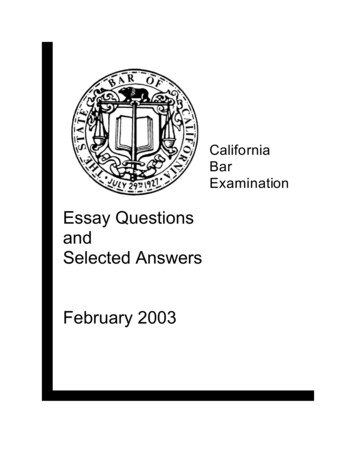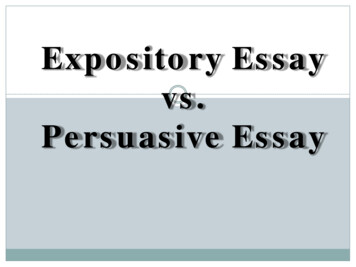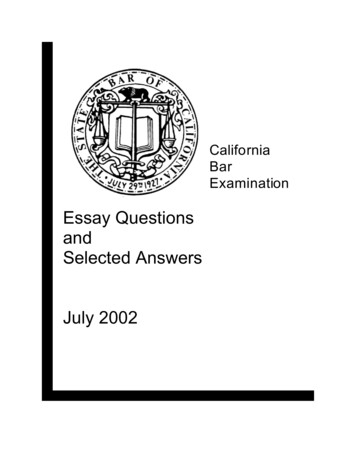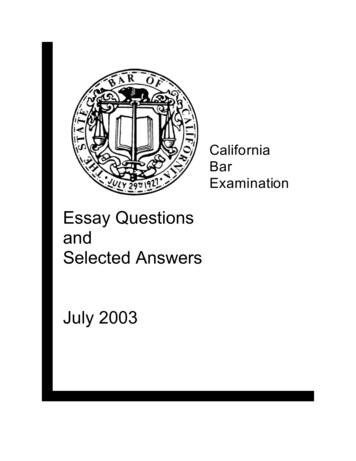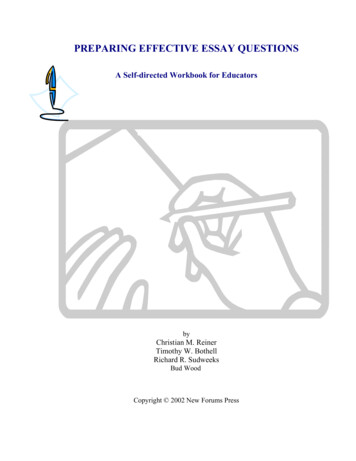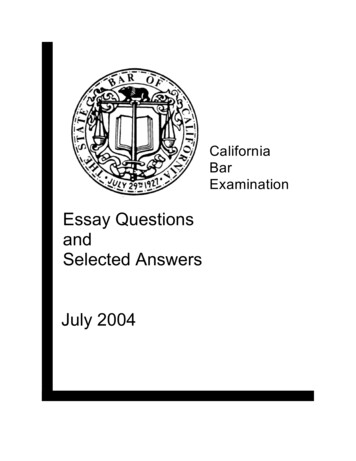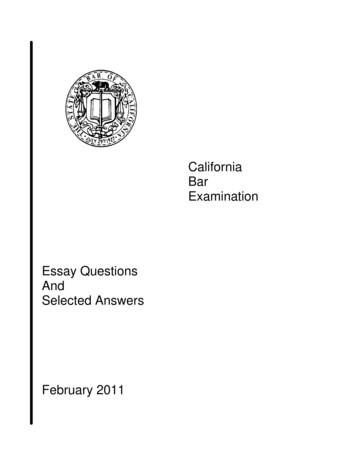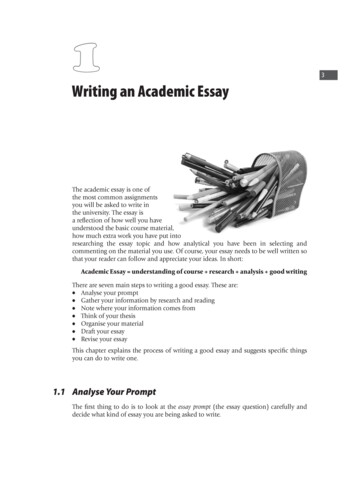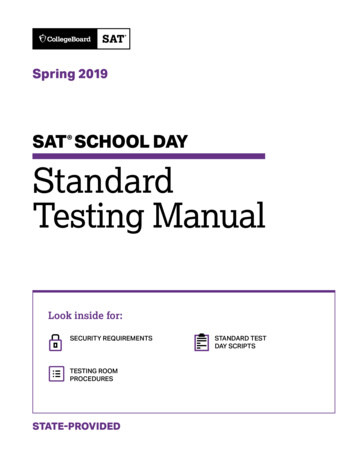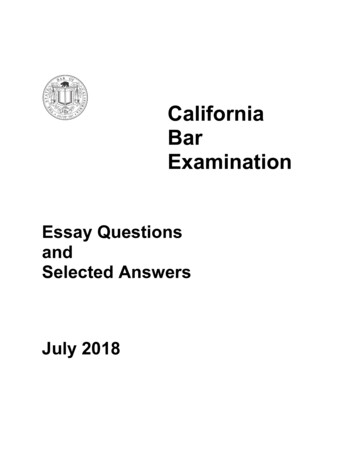
Transcription
CaliforniaBarExaminationEssay QuestionsandSelected AnswersJuly 2018
The State Bar Of CaliforniaCommittee of Bar Examiners/Office of Admissions180 Howard Street San Francisco, CA 94105-1639 (415) 538-2300845 S. Figueroa Street Los Angeles, CA 90017-2515 (213) 765-1500ESSAY QUESTIONS AND SELECTED ANSWERSJULY 2018CALIFORNIA BAR EXAMINATIONThis publication contains the five essay questions from the July 2018 California BarExamination and two selected answers for each question.The answers were assigned high grades and were written by applicants who passed theexamination after one read. The answers were produced as submitted by the applicant,except that minor corrections in spelling and punctuation were made for ease inreading. They are reproduced here with the consent of the authors.Question NumberSubject1.Contracts2.Evidence3.Professional Responsibility4.Community Property5.Constitutional Law
ESSAY EXAMINATION INSTRUCTIONSYour answer should demonstrate your ability to analyze the facts in the question, to tellthe difference between material facts and immaterial facts, and to discern the points oflaw and fact upon which the case turns. Your answer should show that you know andunderstand the pertinent principles and theories of law, their qualifications andlimitations, and their relationships to each other.Your answer should evidence your ability to apply the law to the given facts and toreason in a logical, lawyer-like manner from the premises you adopt to a soundconclusion. Do not merely show that you remember legal principles. Instead, try todemonstrate your proficiency in using and applying them.If your answer contains only a statement of your conclusions, you will receive little orno credit. State fully the reasons that support your conclusions, and discuss all pointsthoroughly.Your answer should be complete, but you should not volunteer information or discusslegal doctrines that are not pertinent to the solution of the problem.Unless a question expressly asks you to use California law, you should answeraccording to legal theories and principles of general application.
QUESTION 1In January, Stan, a farmer, agreed in a valid written contract to sell to Best SauceMaker Company (Best), 5,000 bushels of tomatoes on July 1, at 100 per bushel,payable upon delivery. On May 15, Stan sent Best the following e-mail:“Heavy rains in March-May slowed tomato ripening.late.”Delivery will be two weeksBest replied:“Okay.”On May 22, an employee of Delta Bank (Delta), where Best and Stan banked, told Bestthat rains had damaged Stan’s tomato crops and that Stan would be unable to fulfill allhis contracts. Best called Stan and asked about the banker’s comment. Stan said:“Won’t know until June 10 whether I’ll have enough tomatoes for all mycontracts.”Best replied:“We need a firm commitment by May 27, or we’ll buy the tomatoes elsewhere.”Stan did not contact Best by May 27. On June 3, Best contracted to buy the 5,000bushels it needed from Agro-Farm for 110 per bushel.On June 6, Stan told Best:“Worry was for nothing. I’ll be able to deliver all 5,000 bushels.”Best replied:“Too late. We made other arrangements. You owe us 50,000.”Concerned about quickly finding another buyer, Stan sold the 5,000 bushels to avegetable wholesaler for 95 per bushel.Stan sued Best for breach of contract. Best countersued Stan for breach of contract.Has Stan and/or Best breached the contract? If so, what damages might be recovered,if any, by each of them? Discuss.
QUESTION 1: SELECTED ANSWER AApplicable LawContracts for goods are governed by Title 2 of the Uniform Commercial Code. All othercontracts are governed by common law.GoodsGoods are qualified as movable, tangible objects. As this contract is for bushels oftomatoes, which are movable, tangible objects, this contract will be governed by theUCC.MerchantsThe UCC additionally has special rules for merchants. A merchant is someone whoregularly deals with the types of goods that are the subject matter of the contract,someone who has special knowledge of such subject matter, or a business personinvolved in the transaction.This contract is a contract between Best, a sauce making corporation, and Stan, afarmer, who appears to be a commercial farmer, but even if he is not, he would havespecial knowledge of the goods involved, and therefore both parties qualify asmerchants, and the UCC rules for Merchants will apply.
Possible Breaches of ContractValid ContractIn order to have a valid contract there must be an offer with clear and definite terms,acceptance, consideration, and no defenses to contract. Here, the facts indicate, thatStan and Best have entered into a valid contract. There appears to have clearly been anoffer and acceptance. The only essential terms under the UCC are parties, subjectmatter, and quantity, but this contract also included price and timing. Both haveexchanged valuable consideration, tomatoes for money, and as it’s a valid contract, thereshould be no defenses to formation.Anticipatory RepudiationAnticipatory Repudiation is when one party to a contract clearly and unambiguouslyinforms the other that they will not or cannot perform the performance required by thecontract. Upon an anticipatory repudiation, the non-repudiating party may either (i) treatthe repudiation as a breach and sue immediately, (ii) treat the contract as rescinded, (iii)suspend performance until the repudiating party indeed performs, (iii) or wait and suewhen a breach occurs.Best will argue that Stan repudiated his contract when he sent Best the May 15th emailsaying Delivery will be two weeks late. While under the common law, a time is of theessence clause is not typically enforced as a material breach of contract unless this hasbeen specified when the contract was formed, the UCC requires Perfect Tender, whichapplies to goods, quantity and time of delivery. The UCC does not allow for substantialperformance unless under an installment contract, which this is not. Therefore, Best willargue, by saying that there was going to be a 2-week delay in the delivery of Stan'stomatoes, Stan had anticipatorily repudiated the contract, and Best was allowed to treatsuch anticipatory repudiation as a breach.
Contract ModificationsWhile under the Common Law, a modification to a contract must be supported byconsideration, the UCC only requires good faith to modify the contract.Stan will argue, therefore, that the initial May 15th communications between Best andStan were not a repudiation of the contract, but instead a good faith modification. Stanwill argue that the only reason he was delayed in delivering the tomatoes was due to theheavy rains, a condition completely out of his control, and that therefore his attempt tochange the delivery date will be a good faith effort to modify the contract. He will point toBest's response, an "Okay", as further proof that Best also viewed this communicationas a modification of contract.Because Best did not treat Stan's informing them of the delay as a breach of contract, oras a rescission, but instead answered in the affirmative, “Okay”, a court will most likelytreat this as a modification rather than a repudiation as of May 15.Request for AssurancesUnder the UCC, when a party has a reasonable suspicion that the other party may notperform, they may make a request for assurances in writing from the other party that theywill indeed be able to perform as promised under the contract. Upon receiving a requestfor assurances, the other party must respond within a reasonable period of time (typicallynot to exceed 30 days), also in writing, with assurances that they will be able to completetheir portion of the agreement. If a party fails to respond to a request for assurances, therequesting party may treat this failure as an anticipatory repudiation and take any of theoptions discussed above.Best will argue that the phone call on May 22nd was a request for assurances. Best willargue that due to the information shared with them by their and Stan's bank, they had areasonable suspicion that Stan may be unable to perform and were therefore within theirright under the contract and the UCC to make such a request. Best will argue that Stan's
further uncertainty, about not knowing until June 10, would be even more support for theirrequest for assurances. Best will argue that because Stan failed to respond to theirrequest, he breached the contract by implicitly repudiating the contract, and Best wastherefore within their rights to search elsewhere for their tomatoes to cover any losses.Stan will argue that he did not breach the contract through the May 22nd conversation.First, Stan will argue that because the request for a "firm commitment" was in a phonecall rather in writing, that this was not an enforceable request for assurances. Stan willalso argue that as Best only gave him 5 days, from May 22nd to May 27th, to respond tosuch assurances, with the date of performance still a month away, that this was not areasonable time for him to respond in. Stan will further point out that even if this was aviable request for assurances, Stan gave the assurances on June 6th. Stan will arguethat despite the fact that Best had demanded assurances be given by May 27th, asmentioned above, this was an unreasonable amount of time, and Stan did give themassurances within a reasonable amount of time. June 6, 2 weeks later, is well within 30days, and still well before the date of performance. Stan will further argue that the factthat he had told Best that he wouldn't know until June 10th is even more evidence that therequired date of May 27th was unreasonable.Because Best's request was not in writing, and because they gave Stan less than aweek to respond, most likely a court will not find that Sam breached his contract by failingto respond by May 27th.Revocation of RepudiationIn the event of an anticipatory repudiation, the breaching party may revoke theirrepudiation any time before the date of performance agreed upon on the contractprovided (i) the other party has not rescinded the contract already, (ii) the other party hasnot materially changed their position in reliance of this repudiation, or (iii) the other partyhas not already filed suit for breach of contract.Stan will argue that even if it were found that he repudiated the contract either on May
15th, or the May 22nd through May 27th communications, that he revoked thatrepudiation on June 6th when he said there was nothing to worry about, and he woulddeliver as promised.Best will argue that by that point in time, they had already materially changed theirposition and contracted with Agro-Farm in order to ensure they were able to obtain thenecessary tomatoes, and that therefore Sam's revocation came too late. Stan will arguethat as there was not a proper request for assurances, and that despite this, Stan wasstill able to give assurances well before the July 1st date, that Best itself was breachingthe contract by entering into the agreement with Agro-Farm and refusing to honor thecontract.ImpracticabilityA contract becomes unenforceable if the subject matter of the contract is destroyed, theperforming party dies, or the performance becomes illegal; also if performance becomesimpracticable due to an unforeseen occurrence, (i) the nonoccurrence of which was anessential assumption of the contract, (ii) that makes performance impracticable, and (iii)the other party was not at fault.Finally Stan might argue that he was not repudiating the contract, that the rain made hisperformance impracticable. However, this would have been a foreseeable occurrence,the risk of which Stan would have assumed.Possible DamagesBest's Damages Compensatory DamagesCompensatory Damages are damages meant to put the non-breaching party into theposition they would have been in had the contract been fully performed. Typically these
are determined by the difference of the market price and that of the contract, or thedifference between price of goods purchased in the non-breaching party's attempt tocover and the contract price. A party only needs to put in an objectively reasonable effortin finding a reasonably priced product to cover.Should it be found that Stan did indeed breach the contract, Best will be able to claimcompensatory damages. These would be the difference between the price they paid toAgro-Farm, 110 per bushel for 5,000 equaling 550,000 minus the agreed upon pricewith Stan of 500,000, or 50,000.Consequential DamagesConsequential Damages are any damages that rise naturally out of the breach ofcontract that are not compensatory damages. These damages must be (i) actuallycaused by the breach, but for the breach, these damages would not have been suffered,(ii) foreseeable, and (iii) relatively certain as to the amount.As Best only requested 50,000 dollars from Stan, it does not seem that they sufferedany consequential damages, but if for some reason production were stopped as a resultof having to go through Agro-Farm or something of this nature, they would be able torecover such consequential damages.Incidental DamagesIncidental Damages are damages suffered by the non-breaching party in trying to remedythe breach.Again, it is unclear wither Best suffered any such damages, but if they did in theirattempts to locate and contract with Agro-Farm, these damages too could be recoveredfrom Stan.
Stan's DamagesCompensatory DamagesSee Rule Above.If Best is found to be in breach of contract, Stan also could recover compensatorydamages. These would be the difference in the agreed upon price with Best with whathe was able to sell them for to the vegetable wholesaler. As such, Stan's compensatorydamages would be the 500,000 agreed upon price, minus the 475,000 he receivedfrom the wholesaler or 25,000.Consequential DamagesSee Rule Above.If Stan suffered any consequential damages, such as costs in having to transport thevegetables further, or storage fees, lost profits if he couldn't replant soon enough, etc, solong as these were caused by the breach, foreseeable, and a relatively certain dollaramount, these damages too could be recovered.Incidental DamagesSee Rule Above.If Stan suffered any incidental damages, like Best, he too could recover these.Reliance DamagesReliance damages are recoverable as the costs suffered by the party upon reliance ofthe contract and reliance that the other party would perform. Reliance damages and
compensatory damages cannot both be obtained and as such a party must choosebetween reliance and compensatory damages.Stan, therefore, could choose to take reliance damages that he suffered instead ofcompensatory damagesDuty to MitigateA non-breaching party must do all that is reasonably possible to mitigate damages andeliminate costs. The damages recoverable will be reduced by what has actually beenmitigated, or what could have, should the non-breaching party fail to take steps.Therefore, if Stan were to take reliance damages, they would be mitigated by his sale tothe vegetable wholesaler and the costs such a sale would normally cost Stan.
QUESTION 1: SELECTED ANSWER BThe main issue in this case is whether there was a breach of the contract when Stan didnot reply to a request for assurance of performance. This is a case governed by theUCC since it deals with delivery between merchants.Waiver of Delivery DateIt is likely a court will find that the May 15 email from Stan to Best is a proposedmodification of the contract.At common law, a modification requires consideration. However, as this concernsmovable goods (i.e. tomatoes), the UCC allows for modification as long as it was in goodfaith. Here, the modification of the delivery was due to the heavy rains, which was not,arguably, the fault of Stan. As such, the assent of Best, although without consideration,was binding.Moreover, considering that the contract dealt in goods with a value in excess of 500, themodification had to be in writing. Here, the modification was by email and constitutes awriting in accordance with the Statute of Frauds. As such, the proposed modification isbinding.Alternatively, this is construed as an express waiver of the delivery date. A waiver neednot be supported by consideration, and the mere fact Best replied "okay" is sufficient forthe waiver to be provided. As such, the delay in delivery is valid.Anticipatory Repudiation on May 22According to the facts, Best was informed by a bank employee (Delta) that rains had
damaged Stan's crops, and that Stan would be unable to fulfill all of his contracts. Bestin turn called Stan, who commented that he will not know until June 10 whether there willbe enough tomatoes.An anticipatory repudiation allows the other contracting party to treat the contract asbreached when the other party unequivocally states he will not perform. It is likely that acourt will find that the admission by Stan that he would not know until June 10 whetherthere will be enough tomatoes is not, by itself, a breach of contract as there is no suchunequivocal assurance by Seller that he will be unable to perform. All he said is he willnot know by June 10 whether there will be enough tomatoes for all of his contracts.There is a probability he will breach the contract, but it is not unequivocal amounting to arefusal to perform under the contract. As such, this statement alone is not sufficient toconstitute anticipatory repudiation and therefore, at this point, there has been no breachby Best.Assurance of Performance on May 22As per the same facts, while it did not constitute an anticipatory repudiation, which wouldhave allowed Stan to treat the contract as breached, Stan had reasonable grounds torequire assurance of performance. If there are reasonable grounds for a party to doubtperformance of the contract by the other party, a party may require the other party toprovide reasonable assurance of performance. Until receipt of the reasonableassurance, the party is allowed to suspend performance.Here, it was a Delta employee who told Best about the crops. There is no indicationhere of its reliability, although it may be reasonable for Best to rely on it since it camefrom a bank, and presumably came from a reasonable source. However, even if this factalone was not sufficient, Stan himself admitted to Best that he will not know until June 10whether there will be enough tomatoes. The information, coupled with the admission,allows Best to require the assurance of performance from Stan.
The main issue here is whether there was a reasonable request for assurance ofperformance.It is arguable whether the telephone call by Best demanding a firm commitment by May27 would be considered by the court as reasonable since it was not in writing. Moreover,as Best is aware, Stan would not know until June 10 whether there were enoughtomatoes to comply with the contract. A court may find that it was unreasonable to makeBest wait. However, Stan did secure, as discussed earlier, a valid waiver, of two weeks,which would move the delivery date from July 1 to say July 14. As such, demanding anearlier time for Stan to commit may be held as unreasonable since the delivery date hasbeen delayed for two weeks anyway and therefore, waiting from May 22 to June 10would not be unreasonable.On the other hand, it may be argued that by Best that all Best wanted was for Stan toassure him by May 27 that he will deliver the tomatoes, failing which, he will buy tomatoeselsewhere. Best will also argue that he was not asking for anything else, other than anassurance that Stan will comply. It is likely that a court will agree that a firm commitmentin this case is reasonable since all that Best is asking is that he will receive assurancesthat Stan will perform the contract. Considering that Stan did not reply, Best was entitledto treat the contract as breached.The attempt on June 6 by Best to provide assurance may be treated by the court asbeing too late. In this case, Stan was aware on May 22 that Best intended to buytomatoes from another supplier without adequate assurance of performance. As such,the failure by Stan to reply by May 27 would allow Best to contract for the tomatoes fromAgro- Farm. At best, Best may argue that Stan's failure to commit led Best to reply onthe assumption that performance is not forthcoming and therefore, Best may treat thecontract as breached.Moreover, even if the court found earlier that Stan anticipatory repudiated the contract,Stan is not permitted to retract his repudiation if Best has already detrimentally relied on
the reputation. This is the likely result here since Stan is aware that Best will make otherarrangements if Stan did not contact Best by May 27. As such, Stan took the risk thatBest actually went through, as is here, with securing an alternative supply of tomatoes.As such, it is likely that a court will find that this was reasonable and as such, the failureby the Stan to reply would be considered a breach. If a court finds that this was abreach, then Best was permitted to buy the other tomatoes from Agro-Farm. On theother hand, if the court finds that this was not a reasonable request, then Best is liable forthe breach of contract.ImpossibilityIt is possible that Stan will argue impossibility. Impossibility of performance will only beexcused if it is not objectively possible for Stan to perform. However, it is likely thisargument will fail because even if Stan's farm could not have produced the tomatoes,Stan could have easily performed by buying tomatoes from a different supplier, of equalquality. There is no indication here that Best only wanted Stan's tomatoes, or that Stan'stomatoes were of a unique quality that only Stan could provide. In fact, Best simply wentto Agro-Farm for the other tomatoes, indicating that this was a generic purchase.ImpracticabilityIt is possible that Best will argue impracticability. Impracticability of performance will onlybe excused if its performance will be highly impractical. The mere fact it has becomemore expensive does not by itself make performance impractical. As stated earlier, evenif Stan's farm could not have produced the tomatoes, Stan could have easily performedby buying tomatoes from a different supplier, of equal quality. As such, if he was not sureif he could deliver, Stan should have committed to delivering the tomatoes anyhow.
DamagesApplying the aforementioned, it is likely that a court will find that Stan had breached thecontract, and as such, Best is entitled to damages.As a preliminary matter, both parties had a duty to mitigate damages. Regardless ofwhich party was at fault, both Stan and Best fulfilled their duty to mitigate damages byfinding another customer, and supplier, respectively.Best DamagesThe general rule for damages here are expectation damages, which would put the nonbeaching party at the same place as though the breach did not occur. Here, the contractprice was 5,000 bushels at 100 per bushel (or total of 500,000). On the other hand,Best contracted to buy additional tomatoes at 110 a bushel. As such, the expectationdamages here would be the difference between the original contract price and the newcontract price, or 5,000 x ( 110- 100) 50,000.Moreover, the non-breaching party is allowed to recover incidental expenses incurred bythe breach. Here, there is no showing of incidental expenses.Best is also entitled to recover special damages in the form of lost-profits if this wasspecifically pleaded and was a foreseeable loss due to the breach of the contract. Herehowever Best did not suffer any such damages.As such, Best would only be entitled to recover the 50,000 from Stan, since Best did notmake any down payment. Stan would not be entitled to recover any damages.
Stan DamagesOn the other hand, if the court finds that Best breached the contract, then it will be liableto Stan for expectation damages and incidental damages as well. The same formulawould be applied to compute the expectation damages, which would be the differencebetween the original contract price and the new contract price, or 5,000 x ( 100- 95) 25,000. As said earlier, the non-breaching party is allowed to recover incidentalexpenses incurred by the breach. Here, there is no showing of incidental expenses byStan.As such Stan would only be entitled to recover 25,000, as Best did not make any downpayment.
QUESTION 2Deb was charged in a California state court with battery of a spouse or live-incompanion. Vic, Deb’s live-in boyfriend, was beaten when he stepped out of his car intheir driveway. Vic called 911 about two minutes after the beating and reported thatDeb, his girlfriend, had beaten him.At trial, the prosecution called Vic as a witness. He reluctantly took the stand. Herefused to identify Deb in open court as the perpetrator. He admitted making the 911call in which he reported that Deb had beaten him. The parties stipulated that the 911recording was a business record of the police department, but that Vic’s statements onit were specifically not covered by the stipulation.The prosecution properlyauthenticated the 911 tape, moved the tape into evidence, and played it for the jury.The prosecution also called Sam, a man who had been Deb’s live-in boyfriend eightyears earlier. All evidence pertaining to Sam’s testimony had been properly disclosedto the defense before trial. Sam testified that Deb had threatened to choke him to deathif he left her, and that she had beaten him several times during the time they livedtogether.Deb took the stand in her own defense. She testified that she was working at herdesktop computer in her office at the time of the assault, 20 miles away. She offered aprint-out of a list of file names, which contained the dates and times they were created,indicating they were created on her computer at the time of the beating. She testifiedthat her computer clock was set to the correct time and keeping time accurately on theday of the beating.Assuming all appropriate objections were timely made, should the court have admitted:1. The 911 tape? Discuss.2. Sam’s testimony? Discuss.3. The computer print-out? Discuss.Answer according to California law.
QUESTION 2: SELECTED ANSWER ABatteryBattery is unlawful touching of the victim's person which results in harm or offense.Proposition 8As a preliminary matter, in California, Proposition 8 permits the admission of all relevantevidence in criminal cases, subject to certain exceptions. Hearsay rules and exceptionsstill apply, as do Constitutional requirements. To be relevant, evidence must be: 1)factually relevant, or make a material element of the case more or less likely, and 2)legally relevant, in that the probative value of a piece of evidence outweighs its prejudicialeffect.911 CallThe first issue is whether the 911 tape recording of Vic's statement is admissible.Relevance & AuthenticationThe 911 call is likely relevant because Vic's statement on the 911 call claiming that Debbattered him, if true, makes it more likely that Deb is actually guilty of battery. Theprobative effect of such evidence would far outweigh its prejudicial value. Additionally,the facts state the recording has been properly authenticated.Confrontation ClauseWe must next determine whether admission of the 911 tape violates Deb's rights under
the Confrontation Clause. The Confrontation Clause is a federal Constitutionalrequirement which requires all criminal defendants the opportunity to confront witnessesagainst them. It applies only to the admission of testimonial evidence. Testimonialevidence is generally determined under the "primary purpose" test, in which a statementis adjudged testimonial if the primary purpose of the statement is to assist lawenforcement or give testimony. 911 recordings are generally not considered testimonial.Here, Vic's primary purpose in calling 911 was to seek help, rather than to aid lawenforcement. He did not intend to give testimony in his communications to thedispatcher. Thus, the call was likely not testimonial. Further, Vic has taken the stand asa witness, giving Deb the opportunity to cross-examine him as to the contents of therecording. Thus, regardless of whether the tape was testimonial, its admission does notviolate Deb's Confrontation Clause rights.Hearsay within HearsayThe next issue is whether the tape presents a double hearsay problem. Hearsay is anout-of-court statement offered for its truth. It is generally inadmissible, subject to certainexceptions. When an item of evidence presents two levels of hearsay (as is the casewith a recording), both levels must be subject to an exception to be admissible.Here, the prosecution is trying to admit an out-of-court statement by Vic. The tape is arecording of his voice, which is itself another level of hearsay (Vic's statement is level 1,and the recording of his statement is level 2). Thus, the recording presents a hearsaywithin hearsay problem.Level 1: Vic's StatementNow we must determine whether Vic's statement falls under a hearsay exception.
i.Spontaneous StatementIn California, a spontaneous statement (under the FRE, an excited utterance) occurswhen a speaker becomes frightened or excited by a startling event, and speaks during orshortly after that event while still experiencing the excitement. This type of statement isadmissible as an exception to the hearsay bar, regardless of whether or not a declarantis available.Here, Vic called the police two minutes after he was allegedly beaten by Deb. Thoughthere are no facts which indicate Vic's mental state at the time of the call, being beaten islikely considered a startling event. The prosecution will likely successfully argue that twominutes is not enough time to recover from the stress or shock of such an experience,considering the physical and emotional ramifications. Thus, the first level of hearsay islikely admissible under the spontaneous statement rule.ii. Contemporaneous Sta
Selected Answers . July 2018 . The State Bar Of California Committee of Bar Examiners/Office of Admissions . 180 Howard Street San Francisco, CA 94105-1639 (415) 538-2300 . 845 S. Figueroa Street Los Angeles, CA 90017-2515 (213) 765-1500 . ESSAY QUESTIONS AND SELECTED ANSWERS .
